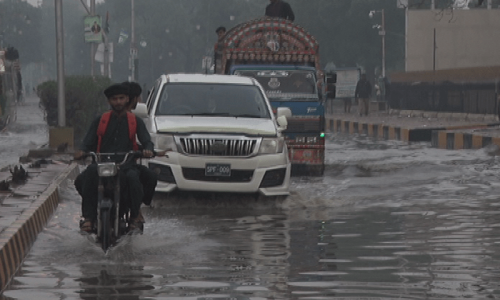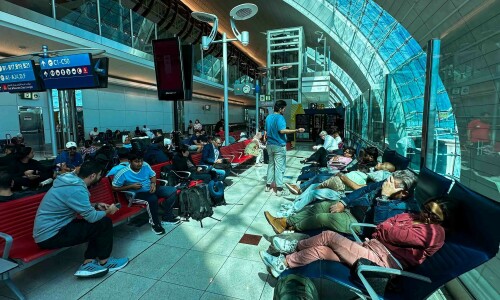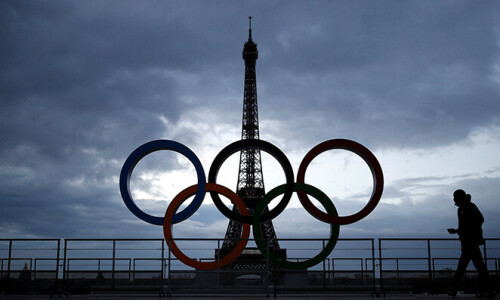ISLAMABAD: The Pakistan Tehreek-i-Insaf (PTI), which usually prefers to quote the decision of the dissenting judges in the Panama Papers case judgement, on Tuesday referred to the majority ruling to emphasise that Article 62 of the Constitution, which deals with the disqualification of parliamentarians, should only be invoked when there is a clear breach of law.
Naeem Bokhari, who represents PTI chief Imran Khan, referred to Justice Sheikh Azmat Saeed’s observation that Article 62(1)(f) could not be allowed to be used as a tool for political engineering by the Supreme Court, nor should it arrogate to itself the power to vet candidates on moral grounds.
“Under our constitutional dispensation, Pakistan is to be governed by the representatives chosen by the people and not chosen by any institution or a few individuals,” Justice Saeed had said in the judgement.
Similarly, the counsel recalled Justice Ejaz Afzal Khan’s remark that the court did not feel inclined to arrogate to itself a power or exercise a jurisdiction which had not been conferred on it by any act of parliament or even by Article 184(3) of the Constitution, which deals with the enforcement of fundamental rights.
Bokhari cites majority verdict in Panama Papers case in Imran’s defence
These arguments come even as the party argues — before a bench hearing the Panama Papers case — that Prime Minister Nawaz Sharif is no longer sadiq or ameen as he has not been truthful to the court, the nation or the National Assembly, and should, therefore, be disqualified.
Mr Bokhari was arguing before a three-judge bench, headed by Chief Justice Mian Saqib Nisar, which had taken up a petition filed by Pakistan Muslim League-Nawaz (PML-N) leader Hanif Abbasi. The petition seeks the disqualification of Imran Khan and PTI secretary general Jahangir Tareen for non-disclosure of assets, existence of their offshore companies and belonging to a foreign-aided party.
The counsel referred to the majority judgement when Justice Umar Ata Bandial asked him whether his client had been rendered dishonest under Article 62.
Justice Bandial also wondered how Article 62(1)(f) would be applicable when there were two views in the Panama Papers case: a minority judgement which suggested that moral violations such as not fulfilling Haqooqul Ibad (the rights of man) were sufficient grounds for disqualification, whereas the majority view held that only a violation of the law would attract such punitive action.
This became important especially when mis-declarations in nomination papers regarding the ownership of a foreign property might attract criminal penalties, but tax evasion or non-filing of income tax returns might not, Justice Bandial observed. The judge also highlighted that no action had so far been taken against legislators who were found guilty of mis-declaration.
But the counsel argued that the non-declaration of foreign assets by his client did not constitute a violation of any law. Mr Khan claims that he had acquired the Draycott Avenue flat in London in 1984 and disclosed its ownership in 2000 to capitalise on a tax amnesty scheme.
Under the election laws, Mr Khan had to declare the property before the Election Commission of Pakistan (ECP), but he lost the 1997 elections, the counsel recalled.
The chief justice also reminded Mr Bokhari that the petitioner’s case was not that Mr Khan had laundered money to purchase the London flat. The petitioner was, in fact, arguing that as the beneficial owner of the property, Mr Khan was supposed to declare it in his tax returns.
He said that while availing the amnesty scheme might relate to the tax part, by not disclosing it to the ECP, Mr Khan had rendered himself “not honest”, which fell under the scope of Article 62.
A sealed box containing the income tax returns of Mr Khan was submitted to the court.
Mr Bokhari also submitted banking transactions showing how money came to Mr Khan’s accounts while he played professional cricket in London and Australia, but the documents were not certified.
The counsel conceded that some of the banks used for these transactions did not exist anymore, at which the chief justice wondered how he got hold of the transaction details. Mr Bokhari clarified that the documents had come from Mr Khan’s accountant and said he would travel to London to have them certified.
Published in Dawn, July 26th, 2017













































